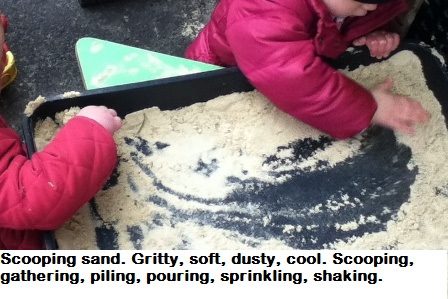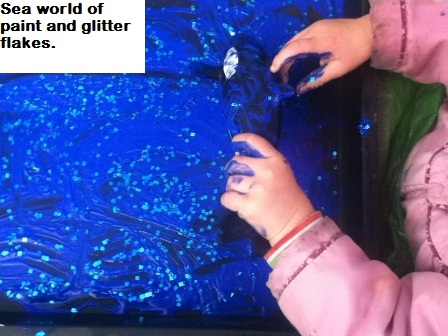Sea Turtles in May and June- Messy, sensory play!
Sea Turtles have had an incredibly
messy couple of months. There is nothing new in sensory play at the nursery,
but they have had an enhanced focus and really pulled out a lot of fun. Some,
but not all of it is recorded in the gallery below. It is very hard to do a
photo shoot when you are elbow deep in wet stuff! And if you are wondering why
on earth messy play is so good for children’s learning, read on…
Gloopy, slippery, fragrant, sticky, oozey...that's
what sensory play is all about! Learning, memory and retention improve
depending upon how many of our senses are engaged. Many of our favourite
memories involve multiple senses. The best way to think about how important our
sensory experiences are in engaging memory are to think about how certain
smells remind us of an event, experience or activity from really early in our
childhood and then a whole range of memories build from that as that is how the
learning took place too.
Further, sensory experiences provide
loads of opportunities for:
Language Development
For children to appreciate and fully utilize their language skills, they must have experiences interesting enough to talk about. Sensory experiences are exciting because children can use the materials differently. Children also develop pre-writing skills as they pour, spoon, grasp, and work on eye-hand coordination tasks as they use the materials.
Personal, Social and Emotional
DevelopmentFor children to appreciate and fully utilize their language skills, they must have experiences interesting enough to talk about. Sensory experiences are exciting because children can use the materials differently. Children also develop pre-writing skills as they pour, spoon, grasp, and work on eye-hand coordination tasks as they use the materials.
Sensory experiences provide children with the opportunity to feel good about their decision-making skills - they control their actions and the experience. Children learn to take some risks and try things that they may have reservations about. It supports an exploratory impulse- essential in developing an eagerness to learn.
In addition, children learn to
cooperate and work together around the sensory table. As the children work
together or side-by-side, they learn to understand and predict someone else’s
actions. The children also have the opportunity to express themselves and
become confident in sharing their experiences with others. Children need an
opportunity to try out their emerging concepts about their world in a safe
environment as well as have appropriate outlets for relieving tension.
Pounding, squishing, feeling water through their hands are all ways of staying in
contact with feelings while learning to control what they do about them.
Physical DevelopmentChildren reinforce and practice their small motor skills while pouring, measuring, stirring, whisking, and manipulating the materials. They learn to control their bodies and give their bodies directions to accomplish tasks as they explore. Gross motor skills are refined as children explore, usually outside, with running through water, examining surfaces with hands and feet, or foot painting.
Creative Development
Sensory experiences provide open-ended opportunities where the process is more important than the product - how children use the materials is much more important than what they make with them. Using creative thinking skills and expressing one's creativity are important self-esteem builders.
Maths
concepts.Sensory experiences provide open-ended opportunities where the process is more important than the product - how children use the materials is much more important than what they make with them. Using creative thinking skills and expressing one's creativity are important self-esteem builders.
Learning about size, conservation, counting, timing (how long it takes the sand to sift versus. the dirt), matching (finding the same size or shape shells or stones), and classifying and sorting (what are colour, texture, item types). As children manipulate the materials, they learn to understand concepts such as more/less, full/empty and sink/float.
Science
concepts
Learning about cause and effect (what
happens when water is added to dirt), gravity (water comes down the funnel not
up), and solid to liquid (cornmeal and water mixture) are also explored.Here is some of how we have explored.....












